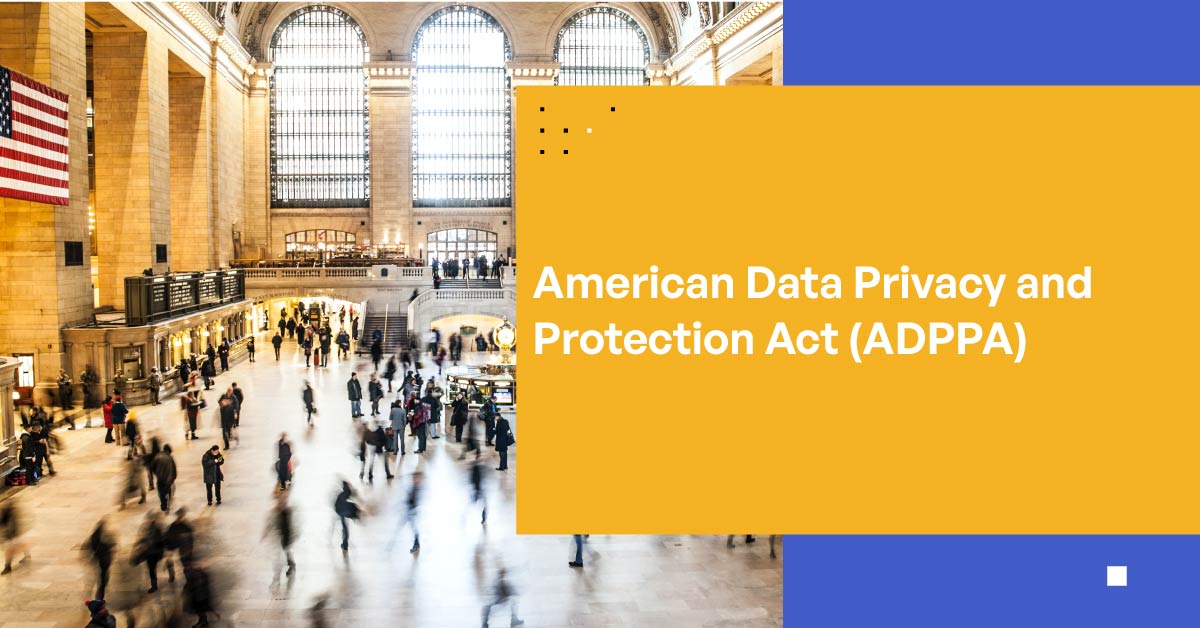Get to Know the American Data Privacy and Protection Act
The importance of data protection cannot be underappreciated. In the United States, this importance is underscored by the implementation of the American Data Privacy and Protection Act (ADPPA). Although this act is yet to be officially passed, it is proposed to offer a more robust and consistent data privacy framework for US citizens that will replace the current patchwork of state privacy laws. The main intention behind the Act is to ensure that businesses handle consumer data in a responsible, transparent, and secure fashion.

In this article, we’ll explore the cyber threats that threaten Americans’ data, the proposed legislation’s framework, including key principles, scope, and what the legislation means for businesses and citizens.
Why Does the US Need the American Data Privacy and Protection Act?
Dedicated to safeguarding the privacy of its residents, the United States identified the pressing need for implementing a strict rule that validates and maintains this objective. In the era of digitalization, personal data has become a gold mine. Businesses, cybercriminals, and governments compete to access this valuable resource, raising significant concerns about privacy and security. What can the US government do to protect the personal data of hundreds of millions of Americans?
The answer came in the form of the American Data Privacy and Protection Act, a major move to ensure the privacy of individuals and their data. The ADPPA aims to protect individuals from unwanted and unauthorized access to their personally identifiable and protected information (PII/PHI).
The Act not only safeguards citizens from exploitation based on their data but also enforces data handling responsibilities on the corporations. For years, businesses with access to vast amounts of personal data have demonstrated a tendency to misuse Americans’ data, either knowingly or unknowingly. The Act, therefore, serves to hold businesses accountable for mishandling consumer data.
Moreover, the Act makes it mandatory for companies to disclose data breaches promptly to affected individuals. This transparency helps to raise awareness about the risks involved in sharing personal data, thus empowering individuals to make informed decisions about their privacy.
In total, the American Data Privacy and Protection Act is not just a necessity but a right owed to every individual. By embracing this law, the United States reaffirms its commitment to the preservation of personal privacy, making it a safer place for its citizens.
Cybersecurity Aspects of the American Data Privacy and Protection Act
The cybersecurity facets of the American Data Privacy and Protection Act (ADPPA) are significant. The Act compels businesses to set in place cybersecurity measures, technologies, and procedures to shield their systems from cyberattacks. These attacks could potentially endanger PII and PHI of American citizens.
The focus of the ADPPA is primarily on implementing mechanisms that prevent such malicious intrusions. It necessitates companies to step up their data protection strategies to counter potential threats, like data breaches and identity theft, in the digital landscape. Moreover, in the event of a data breach, companies are mandated to notify the affected individuals promptly. Overall, the Act is a progressive initiative designed to uphold consumers’ digital rights and regulate data management practices.
Data Privacy Aspects of the American Data Privacy and Protection Act
The American Data Privacy and Protection Act (ADPPA) is an earnest attempt by the US government to ensure the privacy and security of citizens’ data. At its core, the ADPPA regulates how businesses handle, use, and protect Americans’ personally identifiable information (PII).
PII is an umbrella term that encompasses any information that could potentially identify an individual, such as name, address, social security number, email address, and so on. The ADPPA takes a stringent stand on the misuse of such data, aiming to prevent unauthorized access or disclosure.
The ADPPA also strictly stipulates that businesses must clearly inform consumers about the type of data they collect, the purpose of the collection, and who the data will be shared with. Companies are now obliged to gain consumer consent before collecting or processing any PII, facilitating a more transparent relationship between businesses and their customers.
Furthermore, the ADPPA empowers individuals with the right to access, correct, delete, or transport their data held by companies. This ensures that consumers retain control over their personal information, also known as data sovereignty. At the business level, the ADPPA requires companies to implement robust data security measures to safeguard PII. In case of a data breach, firms are mandated to report the incident within a specified time frame, minimizing the impact on affected individuals.
In summary, the American Data Privacy and Protection Act brings about significant changes in the data privacy landscape, emphasizing the importance of individual rights and corporate responsibility to protect personal information. By providing a clearer regulatory framework, the ADPPA improves transparency, enhances trust, and ultimately strengthens the overall data security environment.
Benefits to Organizations
One of the main benefits of the American Data Privacy and Protection Act for organizations is that it provides a clear framework for data protection. By complying with it, companies can avoid the potential legal and financial repercussions of data breaches. Moreover, the Act provides organizations with guidelines on how to maintain customers’ trust and confidence in their digital practices, which is vital for business in the digital era. By adhering to these regulations, companies can demonstrate their commitment to protecting their customers’ data, enhancing their reputation in the process.
Another significant benefit of the Act to companies is the potential to increase the value of their data. By ensuring proper data handling and protection, companies can use the data they collect more effectively and responsibly. This can lead to better-informed business decisions and a competitive advantage in the market. Furthermore, customers are more likely to share their data with companies they trust, leading to a richer and more valuable data pool for the companies to tap into.
Benefits to Consumers
The American Data Privacy and Protection Act is equally beneficial to consumers. It offers consumers greater control over their digital footprints. This includes the right to access and delete personal data held by companies, as well as the right to opt out of data collection entirely. The Act holds businesses accountable for their data practices, ensuring that personal data is not misused or exploited.
Additionally, the Act fosters transparency. With strict penalties for non-compliance, companies are more likely to disclose their data practices and adhere to fair data management principles. As a result, consumers can make more informed choices about sharing their personal information and who they choose to do business with online. This transparency fosters a healthier digital marketplace, where privacy is respected and valued.
Compliance Requirements
Compliance with the American Data Privacy and Protection Act involves a myriad of requirements, all of which organizations must rigorously fulfill. Key among these are the implementation of data management procedures that strictly adhere to the principles delineated by the Act.
One such demand involves the obligatory appointment of a specialized data protection officer. This individual carries the responsibility of overseeing organizational adherence to data protection laws and policies, ensuring lawful and secure handling of sensitive data.
Another crucial component of compliance is the conduction of data protection impact assessments. These are especially significant for high-risk data processing activities. The assessments are designed to evaluate and manage the potential risks that a data processing activity could pose to the privacy rights of individuals.
Companies also have an unequivocal responsibility for ensuring they maintain a valid legal foundation for processing personal data. This requirement extends to honoring the rights of data subjects, which comprise the right to access, rectify inaccuracies, and even delete their personal data.
One of the critical mandates of the American Data Privacy and Protection Act is that organizations must promptly report any data breaches to the relevant regulatory authorities. This must be done within a stringent deadline of 72 hours from the point at which the breach was discovered. Furthermore, organizations are expected to notify affected individuals without any undue delay.
The Act has strict stipulations around data transfers, particularly those that involve the transfer of data beyond the borders of the United States. To comply with these, organizations are required to have appropriate safeguards in place. Additionally, they have to ensure harmonization with the regulations of the receiving country. Failure to comply with the Act can lead to severe repercussions. Non-compliant organizations could face significant penalties, which can manifest in the form of hefty fines, potentially imposing a significant financial burden.
Risks of Non-compliance
The risks of non-compliance with the American Data Privacy and Protection Act are substantial. Companies that fail to comply with the Act may be subject to stringent penalties, including fines of up to $7,500 per violation. In addition to fines, non-compliant companies could face potential lawsuits from affected individuals, leading to further financial and reputational damage.
Beyond financial and legal repercussions, non-compliance can also lead to loss of consumer trust and harm the company’s reputation. In this current business climate, where consumers are increasingly conscious about their data privacy, businesses that fail to respect and protect consumer data could face significant backlash and potentially lose customers. Thus, maintaining compliance with the American Data Privacy and Protection Act is crucial for businesses to stay competitive and maintain their customer base.
Kiteworks Helps Organizations Comply With Data Privacy Regulations like the Proposed American Data Privacy and Protection Act
The American Data Privacy and Protection Act is a significant step towards safeguarding consumers’ data privacy in the digital world. While it has not been enacted yet, the Act’s proposed framework promises to bring coherence to the currently fragmented US privacy laws. By holding businesses accountable to robust data protection standards, the Act aims to foster a digital marketplace that respects and values users’ privacy. It provides numerous benefits to organizations and consumers alike, from fostering trust and increasing the value of data for businesses, to giving consumers greater control over their personal data.
When passed, the Act will replace the current mixture of state privacy laws with one consistent, and national framework, providing clear and concise rules for businesses to adhere to. The Act proposes to place emphasis on transparency, accountability, and the security of personal data. Moreover, it aims to grant consumers greater control over their personal data, including the right to access, correct, and delete their information. The significance of the Act lies in its potential to realign the power dynamics between consumers and businesses, fostering a digital ecosystem where consumers’ data privacy is respected and protected.
Its advent would bring forth a substantial shift in the way businesses handle consumer data, mandating integrity, transparency, and security in data management practices.
The Kiteworks Private Content Network, a FIPS 140-2 Level validated secure file sharing and file transfer platform, consolidates email, file sharing, web forms, SFTP and managed file transfer, so organizations control, protect, and track every file as it enters and exits the organization.
With Kiteworks, businesses utilize Kiteworks to share confidential personally identifiable and protected health information (PII/PHI), customer records, financial information, and other sensitive content with colleagues, clients, or external partners. Because they use Kiteworks, they know their sensitive data and priceless intellectual property remains confidential and is shared in compliance with relevant regulations like GDPR, HIPAA, U.S. state privacy laws, and many others.
Kiteworks deployment options include on-premises, hosted, private, hybrid, and FedRAMP virtual private cloud. With Kiteworks: control access to sensitive content; protect it when it’s shared externally using automated end-to-end encryption, multi-factor authentication, and security infrastructure integrations; see, track, and report all file activity, namely who sends what to whom, when, and how. Finally demonstrate compliance with regulations and standards like GDPR, HIPAA, CMMC, Cyber Essentials Plus, NIS2, and many more.
To learn more about Kiteworks, schedule a custom demo today.

